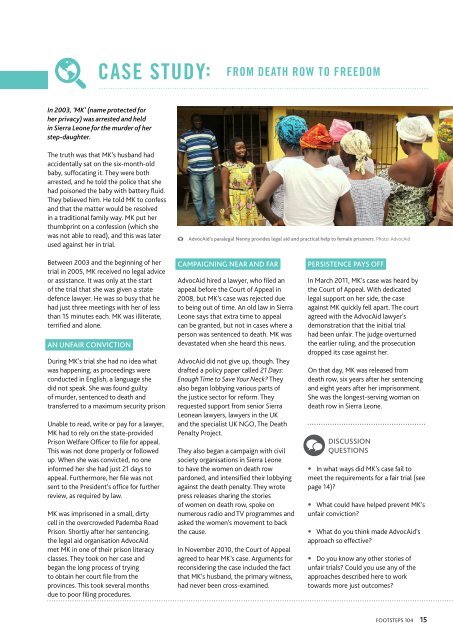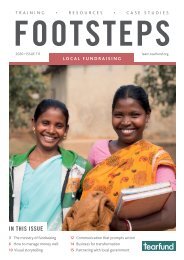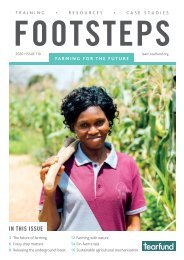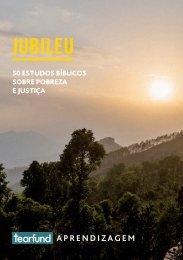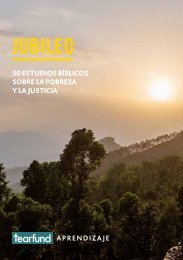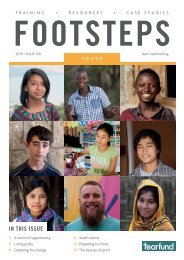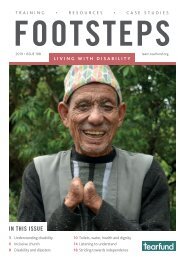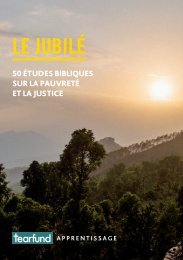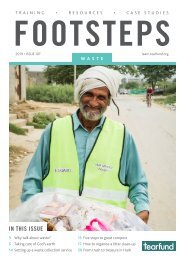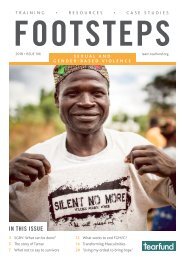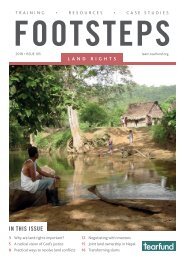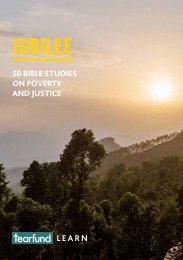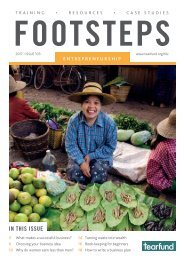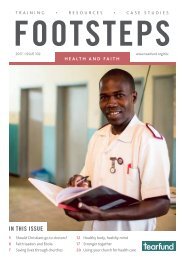Footsteps 104: Prisons
Footsteps 104 features practical tips for getting involved in prison ministry and caring for ex-offenders.
Footsteps 104 features practical tips for getting involved in prison ministry and caring for ex-offenders.
You also want an ePaper? Increase the reach of your titles
YUMPU automatically turns print PDFs into web optimized ePapers that Google loves.
CASE STUDY<br />
FROM DEATH ROW TO FREEDOM<br />
In 2003, ‘MK’ (name protected for<br />
her privacy) was arrested and held<br />
in Sierra Leone for the murder of her<br />
step-daughter.<br />
The truth was that MK’s husband had<br />
accidentally sat on the six-month-old<br />
baby, suffocating it. They were both<br />
arrested, and he told the police that she<br />
had poisoned the baby with battery fluid.<br />
They believed him. He told MK to confess<br />
and that the matter would be resolved<br />
in a traditional family way. MK put her<br />
thumbprint on a confession (which she<br />
was not able to read), and this was later<br />
used against her in trial.<br />
AdvocAid’s paralegal Nenny provides legal aid and practical help to female prisoners. Photo: AdvocAid<br />
Between 2003 and the beginning of her<br />
trial in 2005, MK received no legal advice<br />
or assistance. It was only at the start<br />
of the trial that she was given a state<br />
defence lawyer. He was so busy that he<br />
had just three meetings with her of less<br />
than 15 minutes each. MK was illiterate,<br />
terrified and alone.<br />
AN UNFAIR CONVICTION<br />
During MK’s trial she had no idea what<br />
was happening, as proceedings were<br />
conducted in English, a language she<br />
did not speak. She was found guilty<br />
of murder, sentenced to death and<br />
transferred to a maximum security prison.<br />
Unable to read, write or pay for a lawyer,<br />
MK had to rely on the state-provided<br />
Prison Welfare Officer to file for appeal.<br />
This was not done properly or followed<br />
up. When she was convicted, no one<br />
informed her she had just 21 days to<br />
appeal. Furthermore, her file was not<br />
sent to the President’s office for further<br />
review, as required by law.<br />
MK was imprisoned in a small, dirty<br />
cell in the overcrowded Pademba Road<br />
Prison. Shortly after her sentencing,<br />
the legal aid organisation AdvocAid<br />
met MK in one of their prison literacy<br />
classes. They took on her case and<br />
began the long process of trying<br />
to obtain her court file from the<br />
provinces. This took several months<br />
due to poor filing procedures.<br />
CAMPAIGNING NEAR AND FAR<br />
AdvocAid hired a lawyer, who filed an<br />
appeal before the Court of Appeal in<br />
2008, but MK’s case was rejected due<br />
to being out of time. An old law in Sierra<br />
Leone says that extra time to appeal<br />
can be granted, but not in cases where a<br />
person was sentenced to death. MK was<br />
devastated when she heard this news.<br />
AdvocAid did not give up, though. They<br />
drafted a policy paper called 21 Days:<br />
Enough Time to Save Your Neck? They<br />
also began lobbying various parts of<br />
the justice sector for reform. They<br />
requested support from senior Sierra<br />
Leonean lawyers, lawyers in the UK<br />
and the specialist UK NGO, The Death<br />
Penalty Project.<br />
They also began a campaign with civil<br />
society organisations in Sierra Leone<br />
to have the women on death row<br />
pardoned, and intensified their lobbying<br />
against the death penalty. They wrote<br />
press releases sharing the stories<br />
of women on death row, spoke on<br />
numerous radio and TV programmes and<br />
asked the women’s movement to back<br />
the cause.<br />
In November 2010, the Court of Appeal<br />
agreed to hear MK’s case. Arguments for<br />
reconsidering the case included the fact<br />
that MK’s husband, the primary witness,<br />
had never been cross-examined.<br />
PERSISTENCE PAYS OFF<br />
In March 2011, MK’s case was heard by<br />
the Court of Appeal. With dedicated<br />
legal support on her side, the case<br />
against MK quickly fell apart. The court<br />
agreed with the AdvocAid lawyer’s<br />
demonstration that the initial trial<br />
had been unfair. The judge overturned<br />
the earlier ruling, and the prosecution<br />
dropped its case against her.<br />
On that day, MK was released from<br />
death row, six years after her sentencing<br />
and eight years after her imprisonment.<br />
She was the longest-serving woman on<br />
death row in Sierra Leone.<br />
DISCUSSION<br />
QUESTIONS<br />
••<br />
In what ways did MK’s case fail to<br />
meet the requirements for a fair trial (see<br />
page 14)?<br />
••<br />
What could have helped prevent MK’s<br />
unfair conviction?<br />
••<br />
What do you think made AdvocAid’s<br />
approach so effective?<br />
••<br />
Do you know any other stories of<br />
unfair trials? Could you use any of the<br />
approaches described here to work<br />
towards more just outcomes?<br />
FOOTSTEPS <strong>104</strong><br />
15


